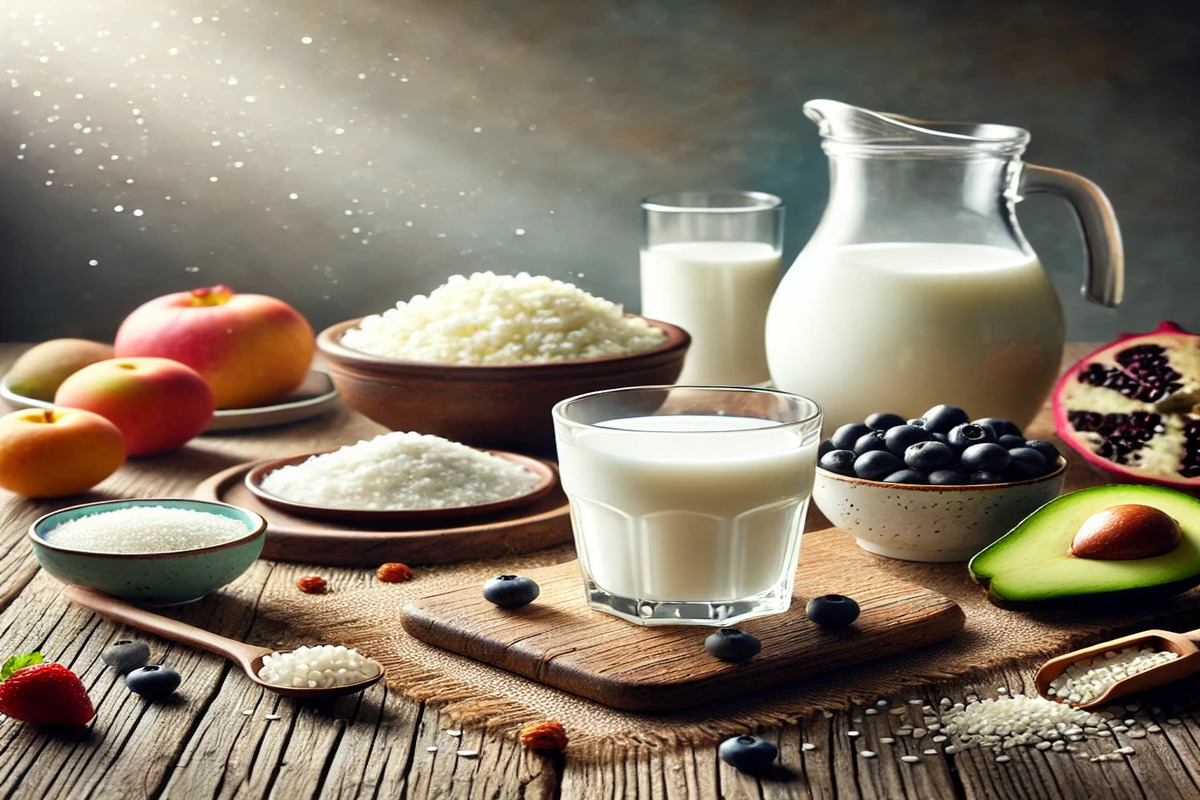Kefir, an ancient fermented drink with a rich history, has been gaining popularity in recent years due to its numerous health benefits and unique taste. Read More
What Is Kefir?
Kefir is a cultured, fermented milk drink similar to yogurt but with a thinner consistency. It is made by adding kefir grains to milk, which then ferment the lactose into lactic acid, giving kefir its characteristic tangy flavor. The fermentation process typically takes about 24 hours, resulting in a beverage rich in beneficial bacteria and yeast.
Key Components of Kefir:
- Probiotics: Kefir contains a wide range of probiotics, including Lactobacillus, Bifidobacterium, and Saccharomyces, which are known for their positive effects on gut health.
- Nutrients: It is a good source of protein, calcium, magnesium, phosphorus, and B vitamins.
- Low Lactose: The fermentation process reduces the lactose content, making it easier to digest for those with lactose intolerance.
Health Benefits of Kefir
Kefir is more than just a refreshing drink; it’s a powerhouse of health benefits that can improve your overall well-being. Here are some of the key advantages of incorporating kefir into your diet:
1. Improved Gut Health
Kefir is rich in probiotics, which are beneficial microorganisms that support a healthy gut microbiome. A balanced gut microbiome is crucial for digestion, nutrient absorption, and immune function. Regular consumption of kefir can help:
- Enhance Digestion: Probiotics in kefir aid in breaking down food and absorbing nutrients more efficiently.
- Alleviate Constipation: The probiotics can help regulate bowel movements and relieve constipation.
- Reduce Inflammation: Kefir may reduce gut inflammation and symptoms of irritable bowel syndrome (IBS).
2. Strengthened Immune System
The probiotics and bioactive compounds in kefir can bolster your immune system by promoting the production of antibodies and enhancing the body’s natural defenses. Kefir also contains antioxidants that protect the body from harmful free radicals.
- Antibacterial Properties: Certain probiotics in kefir have been shown to inhibit the growth of harmful bacteria like Salmonella and E. coli.
- Immune Modulation: Probiotics can help modulate the immune response, making the body more efficient at fighting infections.
3. Bone Health Support
Kefir is an excellent source of calcium, magnesium, and vitamin K2, all of which are essential for maintaining strong and healthy bones. Vitamin K2, in particular, plays a critical role in calcium metabolism and bone mineralization.
- Preventing Osteoporosis: Regular consumption of kefir can help increase bone density and reduce the risk of osteoporosis.
- Enhancing Calcium Absorption: The lactic acid bacteria in kefir improve calcium absorption, contributing to bone health.
4. Potential Anti-Cancer Properties
Some studies suggest that the probiotics and bioactive compounds in kefir may have anti-cancer properties. They may help inhibit tumor growth and reduce the risk of certain cancers, although more research is needed in this area.
- Inhibition of Tumor Growth: The probiotics may interfere with carcinogen production and reduce tumor growth.
- Enhancing Chemotherapy: Kefir could potentially enhance the effectiveness of chemotherapy by boosting the immune system.
5. Improved Mental Health
The gut-brain connection is a well-established phenomenon, and kefir’s probiotics can play a role in improving mental health. By supporting a healthy gut microbiome, kefir can help:
- Reduce Anxiety and Depression: Probiotics may influence brain chemistry and reduce symptoms of anxiety and depression.
- Enhance Cognitive Function: A healthy gut microbiome is linked to better cognitive function and memory.
How to Incorporate Kefir into Your Diet
Kefir is a versatile beverage that can be easily incorporated into your daily routine. Here are some ways to enjoy kefir:
1. As a Drink
The simplest way to consume kefir is to drink it straight. It can be enjoyed plain or flavored with fruits, honey, or spices for added taste.
2. In Smoothies
Kefir makes an excellent base for smoothies. Blend it with fruits, vegetables, and seeds for a nutritious and delicious drink.
3. As a Substitute
Kefir can be used as a substitute for buttermilk or yogurt in recipes, adding a probiotic boost to baked goods, salad dressings, and marinades.
4. In Breakfast Bowls
Pour kefir over granola or oats, and top with fresh fruit and nuts for a probiotic-rich breakfast bowl.
Final Thoughts
Kefir is an ancient fermented drink that offers a multitude of health benefits, from improving gut health to boosting the immune system and supporting bone health. With its rich probiotic content and nutrient profile, kefir is a valuable addition to a balanced diet. Whether you enjoy it as a refreshing drink or incorporate it into your meals, kefir is a delicious and nutritious way to enhance your well-being.

